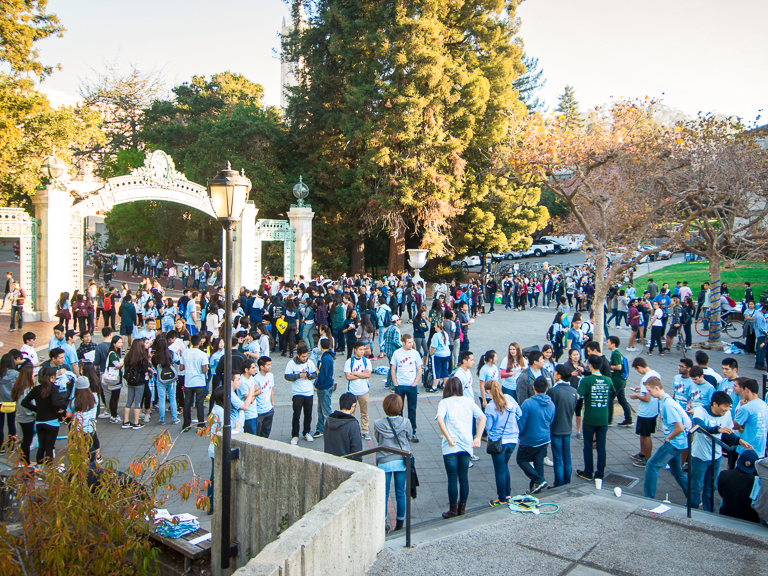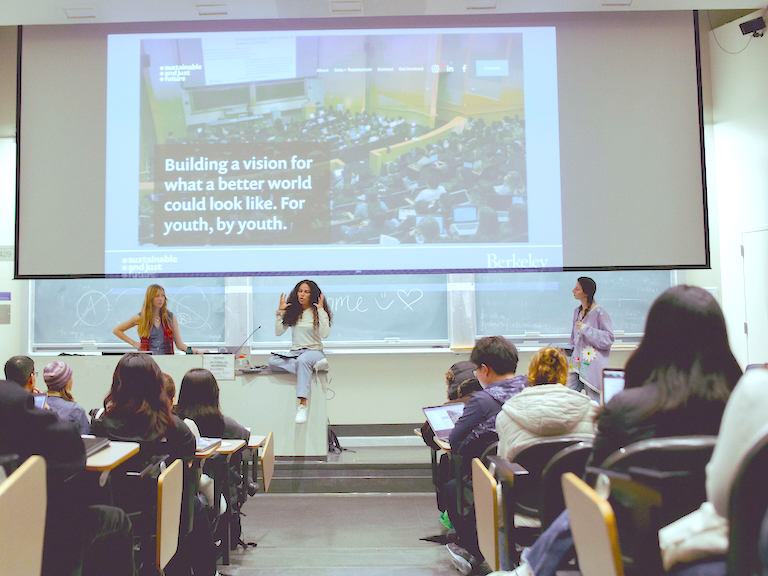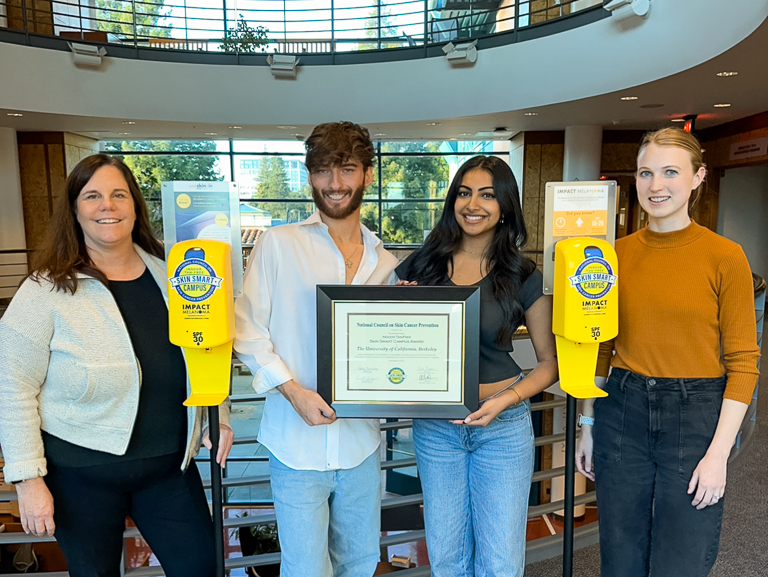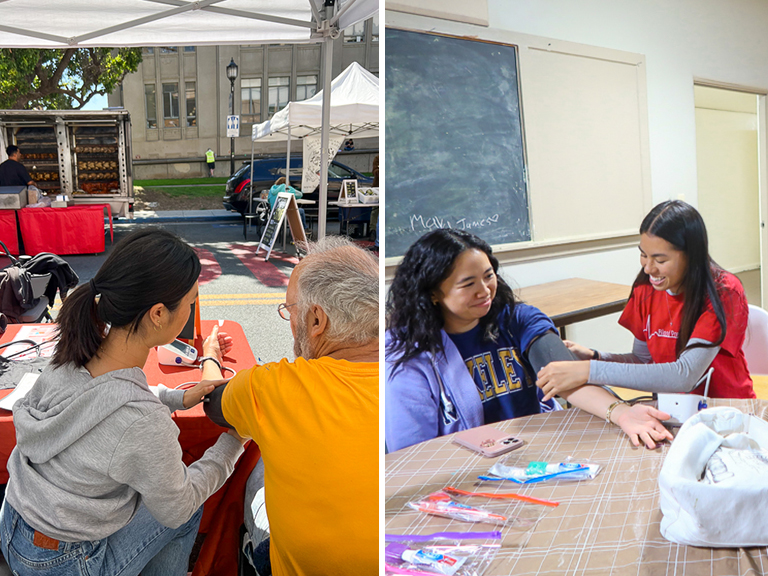
Student volunteers with the Berkeley Project gather in front of Sather Gate on campus.
Don’t Wait, Get Involved
Put your time and talent into making an impact while you are at Cal. There are many great causes you can get involved in through UC Berkeley student organizations, and they need undergraduate and graduate students like you ready to turn your passion into action!
I highly recommend utilizing CalLink to the fullest—use the filters and scroll through the many pages of clubs and organizations UC Berkeley has to offer. Explore ways to get involved in causes close to your heart, or find new ones that interest you. Here are a few organizations to consider and inspire you in your search.
Be Part of Social Justice, Change, and Impact
The Berkeley Group is UC Berkeley’s first social sector professional consulting organization. They work to provide local social sector organizations with sustainable business advice and are the only student organization dedicated to providing consulting services to NPOs.
Alternative Spring Breaks with the Public Service Center are a great way to get involved, earn units, and remain engaged over spring break. The program offers student-led service-learning trips for students to explore a social justice issue through hands-on service supplemented with education and reflection. Students are enrolled in a two-unit DeCal that prepares them for the service learning trip. You can learn more about Alternative Spring Breaks in our blog on past student perspectives on the program.
The Berkeley Project is the largest community service organization on campus. Every semester they organize Berkeley Project Day and bring together 2,000 volunteers to work alongside community members on a project dedicated to the city of Berkeley. It is fully student-run and aims to foster a spirit of service and community. Make sure to check out their Instagram @theberkeleyproject to see them in action!
Support Sustainability with the Student Environmental Resource Center (SERC) and any of its 40+ eco organizations. SERC itself also has many opportunities for students to get involved, including vermicomposting co-supervisor roles that one student, Lucy, took on.
You can also get involved with sustainability through taking a DeCal class or joining eco-organizations on campus.
“Our ‘Solutions for a Sustainable and Just Future’ DeCal course currently enrolls a majority of non-environmental majors (2/3 of our students are not from climate disciplines). 98% of our students would recommend the course to others and 70% are committed to engaging in environmental initiatives after the course ends. Our climate curriculum is different than the classic doomsday narrative; it is solutions-focused and actionable. Rather than teaching our students what to think, we provide a framework for how to think about sustainability and climate. This class will change the way you view and interact with the world around you.” — Elli Arzbaeche, lead for the Spring 2024 DeCal course

Solutions for a Sustainable and Just Future DeCal. Photo by Sam Quiñones.
You can learn more about Elli’s perspective on the DeCal in our blog, “3 Sustainable Orgs,” and discover even more sustainability-focused organizations in our “Earth-first Clubs & Values @ Cal” blog.
Undergraduates and graduates can become a volunteer at one of the many programs and organizations on campus, including but not limited to:
- The Basic Needs Center’s Food Pantry, which is always looking for more volunteers to help keep the pantry running smoothly, has opportunities for paid student workers. Learn more about both opportunities on their Volunteer & Job Opportunities webpage.
- The Lawerence Hall of Science has opportunities for volunteers to support museum staff across the museum and its programs, including events and the Planetarium. Weekday or weekend, morning or afternoon shifts are available. More information can be found on their volunteer webpage.
- The UC Botanical Garden’s volunteers educate the public, maintain the collection, conduct research, grow plants for sale, and more. Volunteers are welcome across departments, and a list of current opportunities can be found on the garden’s website.
Help Heal Communities
The Health Worker Program through University Health Services (UHS) is a peer education program dedicated to promoting personal and residential community health practices. Health Workers work individually and as part of a team, usually serving for one to two years in their residential or academic communities, from Residence Halls to campus departments to sororities and fraternities.
“I was motivated to join the Health Worker Program because of a flyer that I saw on my [residence hall’s] bulletin board in the fall of my freshman year. I knew very little about college health, so I decided that this would be a good way for me to learn and gain field experience. An experience that stands out was when one of the school athletes under my cohort had a major injury and checked in with me every single week until they were fully healed. This was the longest prolonged interaction I had with a resident—over two months. They checked in with me weekly for my peer health assessments. I was able to help them through their healing process by providing the supplies they needed and directing them to the right resources when they needed them, which they told me was extremely helpful. It’s been a great journey both in learning about peer and college health and in developing my peer communication and leadership skills. This is a really good opportunity for anyone interested in any health-related career to explore the world of healthcare in a low-stress environment! I also want students to know that you don’t have to be pre-health to be a part of the program–we have positions that are open for academic departments not related to health majors.” — Lauren Chiang, Genetics and Plant Biology major and HWP Program Assistant, Class of 2026
“One of our students, Broc, had a passion for skin health and skin cancer prevention. He recognized the need for more proactive measures to encourage sunscreen usage among his fellow students. Broc partnered with University Health Services and the ASUC to help UC Berkeley become a “Platinum Level Skin Smart Campus” through The National Council on Skin Cancer Prevention. This award recognizes UC Berkeley’s commitment to ensuring the well-being of the campus community and providing a safe, healthy learning and living environment on and off campus. UC Berkeley pledges to keep indoor tanning devices off the campus and out of all affiliated buildings and to promote skin cancer prevention and UV safety education. We were also awarded two free sunscreen dispensers, which are now located in the Golden Bear Cafe and the UHS Tang Center. We are very proud of our Health Worker, Broc, for making this happen! — Lauren Magdaleno, Health Educator in the Health Promotion Unit at UHS

Broc (left) next to the sunscreen dispensers at UHS. Photo courtesy of Lauren Magdaleno.
The Blood Pressure Project (BPP) is dedicated to bringing blood pressure awareness and education to Berkeley’s underserved communities. The organization provides clinical volunteering opportunities for UC Berkeley students four days a week at different locations, all within walking distance of campus. They also host biweekly general meetings and learn from professionals in the field of medicine—most recently, Dr. Dawn Gross from UCSF taught BPP about the “injury of grief” in patients who receive terminal diagnoses.
“Blood Pressure Project serves the community by volunteering at suitcase clinics, farmers’ markets, and on Sproul every week. Students provide free blood pressure screenings and help educate the Berkeley community on cardiovascular health. BPP has allowed me to find a group of passionate pre-health students at UC Berkeley. I’ve loved meeting other members while volunteering, and then seeing them later that week in my classes. While volunteering, BPP has also taught me how to professionally interact with different types of patients and clients, because people of so many different backgrounds come in to have their blood pressure taken. I think this is an invaluable experience for students who hope to pursue a healthcare career.” – Karina Chen, Nutritional Science major, Class of 2026, BPP Marketing Officer

Photos courtesy of Blood Pressure Project.
Clinics around Berkeley also take student volunteers. Berkeley Career Engagement’s list of clinics, medical centers, and nonprofits nearby is a good place to start your search. Remember to check each organization’s website to ensure they are taking student volunteers and to reach out with any questions you may have.
Become a Mentor
Mentor Youth with the Public Service Center. Bridging Berkeley is a math mentoring program that matches UC Berkeley work-study students and volunteers with Berkeley middle school students. CREATE (Creative Residencies for Emerging Artists Teaching Empowerment) is a student-led group that promotes arts-based services—undergraduates teach classes to meet the enrichment needs of local schools and community organizations
UC Berkeley’s Matriculate Club works to empower high-achieving, low-income high school students to apply to the nation’s top selective schools by pairing college students to work one-on-one with high school students to mentor them through the college application process. Stay up to date with Matriculate and follow their Instagram, @ucbmatriculate.
Mentor a first-generation college student with the Berkeley Mentor Collective. Using a platform called Mentor Collective, student mentors are matched with a first-generation student at Berkeley for an academic year. Mentors and mentees meet online or in person at least five hours a month, and mentors build communication and interpersonal skills throughout their time with the program.
Use Your Voice: Get Civically Engaged
Graduates: Get active in the Graduate Student Assembly, an incredible support system dedicated to addressing and advocating for the unique needs, resources, and programming of graduate students. Join monthly meetings! Find out more ways to help improve students’ lives by getting involved.
Undergraduates: Get involved in one of the largest and most autonomous student organizations in the nation, the ASUC Student Government. The ASUC has the singular focus of supporting and advocating for students’ best interests. It also manages millions of dollars in student services, which go back to the student body.
“Something really unique about the ASUC is its position as a bridge between administrators, campus resources, and students. Our main goal is to serve students. If you ever have a question about where you can find a space, how to get more funding for your organization, or how to find support within administrative settings for your organization, we’re here to help. We love interacting with constituents and students and love hearing from them. We believe that’s how we make the most informed decisions and make the most impact on campus, by listening to students.” — Sydney Roberts, ASUC President 2023–24
You can read more about Sydney’s experience in the ASUC in our blog, Get Involved with ASUC @ Cal.
The Perfect Org For You
I hope this blog encouraged you to start your journey in getting involved on campus or in surrounding communities! Have patience in finding the right fit for you, and don’t shy away from trying new things. You never know what you’ll learn—but know that you’ll always have the chance to make an impact at Berkeley.
By Melissa Mora-Gonzalez, Class of 2025, majoring in English and minoring in conservation and resource studies. This story was inspired by an earlier version first published in 2020 by Student Affairs Communications, then revised and updated in 2023 by Preslee Vanlandingham, Class of 2023, English major and creative writing minor.
Want More?
- How to find the right clubs and organizations for you, and learn how to get started in your club journey.
- More reasons you should join a club at Berkeley.
- Learn how to find and join clubs as a transfer.